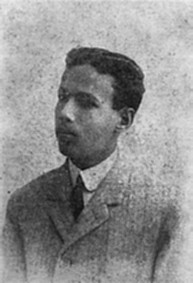4.1.1.6.3 The prose texts of José Manuel Poveda (1888 – 1926)

Poveda’s prose work began even before his first forays into poetry, at least in the world of periodical publications. When he was only 11 years old, he was already writing a handwritten weekly entitled “Cuba,” which demonstrates his early interest in literature, both historical and literary.
Also in his early youth, he wrote political humor and other similar pieces for “La Voz del Pueblo” and “El Managui.” He even went to prison in 1920 for impolite remarks about the President of the Republic, then held by Mario García Menocal, in one of his articles.
In his prose texts – or rather his chronicles, since he did not leave many truly narrative pieces – dissimilar influences and some contradictions can be seen, even in terms of his denial of modernism and the presence of these elements in his prose, also permeated by a lyricism that he could not shake off in his desire to separate both literary strands.
He carried his political stance—anti-Spanish and anti-North American, although not supported by a significant ideological corpus—into the literary realm, as he generally disdained writers of these nationalities, with the exception of Walt Whitman, to whom his poetic prose owes a special debt.
Regarding Poveda’s prose, Marcelo Pogolotti writes: “It sustains a pessimism that exposes clear glimpses of our social and moral weaknesses, slippery and vulgar. His brief writings on the evasive nature of Cubans, always on the lookout for the easiest path, and on the salacious and mocking humor of “cubaneo” (the Cubans), can be counted among the most astute and accurate judgments that have been made on the subject to date.”
His prose is marked by the same individualistic conception of the poet: the requirement to “give of oneself,” which constitutes a poetic axiom he proposes to young people, is also exacerbated in his prose, as he believes it must, in a certain sense, reject previous schools and styles; the writer’s being exists only in the act of writing. This worldview would overflow his work and determine certain destructive vital attitudes, such as his attraction to drugs, which he considered substances that exacerbated his individual conscience and supposedly opened new spiritual spaces for him.
Many of his prose texts were intended to explain his own poetic worldview—and, more broadly, his artistic vision, as in the fragment “Truth and Beauty”:
“As artists, we seek beauty. As historians, truth. But, creators, in art we want the most inaccessible beauty; in history we want the deepest truth. Without failing in beauty or truth, perhaps we could find a homeland as new as our art, and worthy of being loved, and capable of giving us beauty as much as art. Pioneers! Oh, pioneers! Meanwhile, with blows of the axe, we will bleed to make our way through the dark forest. Pioneers! Oh, pioneers! To reach beauty and truth, with hands, face, and chest raw, with blows of the axe, for a less accessible art and a deeper truth.”








